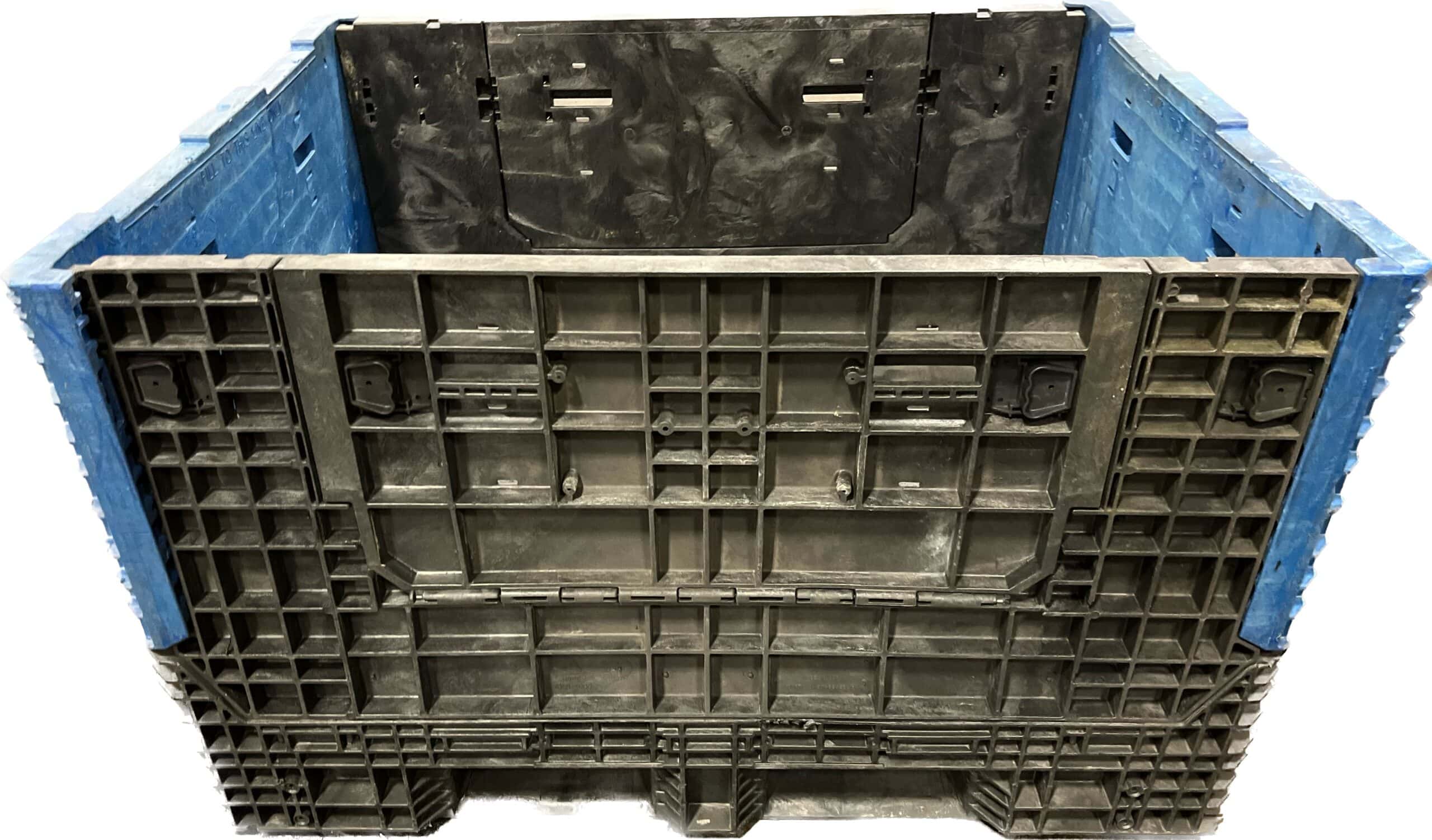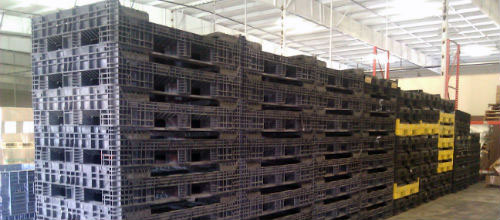The Ultimate Guide to Selecting the Right Bulk Containers for Your Business Requirements
Picking the ideal mass containers is vital for any organization that depends on reliable logistics. Various types of containers exist, each made for specific materials and applications. Elements such as size, material compatibility, and governing requirements play a substantial function in this decision-making process. Recognizing these components can result in enhanced functional performance. Several companies overlook necessary facets that could boost their total efficiency and sustainability. What are these factors to consider?
Comprehending Various Sorts Of Mass Containers
Mass containers serve as essential devices for companies looking for effective storage and transportation remedies. These containers are available in different kinds, each made to meet specific operational demands. One usual kind is the intermediate bulk container (IBC), which is excellent for fluid and granulated products, supplying an equilibrium of ability and maneuverability. One more prominent choice is the bulk bag, or FIBC, ideal for dry, flowable products. These versatile containers are lightweight and can be conveniently moved and stored. For heavier materials, inflexible mass containers are often used, providing toughness and stability for risk-free handling. Additionally, there are specialized containers customized for unsafe products, guaranteeing compliance with safety policies. Comprehending the distinct features of these bulk container types enables organizations to make informed decisions that maximize logistics and minimize prices. By picking the ideal container, firms can improve their operational performance and enhance their supply chain processes.
Secret Product Factors To Consider for Mass Containers
When choosing bulk containers, it is vital to ponder the materials utilized in their building and construction. Variables such as longevity, toughness, and chemical compatibility play an important function in guaranteeing the containers meet certain operational needs. In addition, weight and mobility worries can impact both performance and transportation logistics.
Material Toughness and Toughness
Toughness and strength are critical factors in choosing products for bulk containers, as they directly influence the container's capacity to hold up against various ecological problems and taking care of processes. Products such as high-density polyethylene (HDPE), polypropylene, and stainless-steel are generally preferred for their durable buildings, supplying resistance to abrasion, temperature, and impact fluctuations. The option of product also impacts the total life expectancy of the container; more powerful materials typically result in much less constant substitutes, resulting in set you back savings in time. Furthermore, the weight of the material can influence delivery expenses and simplicity of handling. Companies have to consider their specific functional settings and the potential for deterioration to assure peak resilience and stamina in their bulk container option.
Chemical Compatibility Factors
Recognizing chemical compatibility is necessary for picking bulk containers, as the products made use of need to withstand the details materials they will certainly hold. Different factors influence compatibility, consisting of the chemical nature of the contents, temperature level, and duration of storage space. Harsh chemicals may call for containers made from stainless steel or specialized plastics that withstand destruction. Additionally, reactive materials can generate warm or gases, demanding vented or pressure-rated containers. The option of container product, whether polycarbonate, steel, or polyethylene, ought to align with the chemical residential properties of the saved substances to avoid leaks or breaches. Inevitably, a complete examination of these compatibility factors ensures risk-free handling and storage space, safeguarding both workers and the atmosphere while preserving product integrity.
Weight and Transportability Concerns
Selecting mass containers includes not only assessing chemical compatibility but additionally taking into consideration weight and portability. Businesses have to assess the ease of handling and transportation to maximize performance. Lightweight products like high-density polyethylene (HDPE) or aluminum can help with much easier activity and reduce shipping costs. On the other hand, heavier containers might give improved sturdiness but can impede wheelchair, particularly in environments requiring constant relocation. Additionally, the layout of the container ought to enable for hassle-free lifting and stacking, guaranteeing ergonomic safety for employees. Companies ought to likewise think about the framework readily available for transportation; for example, containers suitable with forklifts or pallet jacks can streamline operations. Ultimately, the appropriate equilibrium in between weight and transportability directly influences operational performance and price efficiency.
Sizing Your Bulk Containers for Optimal Performance
When sizing bulk containers, services need to meticulously analyze the dimensions required to suit their certain items. Additionally, weight capability is an essential element that influences efficiency and safety during transport and storage space. Reliable sizing not just maximizes area but likewise optimizes functional process.
Identifying Container Dimensions
Selecting the best measurements for mass containers is important for making best use of effectiveness in storage space and transport. Companies have to assess their particular requirements, taking right into account factors such as available room, the nature of the products being saved, and the methods of transportation utilized. Exact dimensions assure that containers fit preferably in warehouses and vehicles, minimizing squandered space and reducing handling time. Criterion sizes can supply comfort, but custom look at these guys dimensions could be needed for distinct needs or to fit particular items. In addition, it is very important to review stacking capacities and access, as these factors affect overall operational performance. Eventually, the best dimensions bring about boosted company see it here and streamlined logistics, profiting the total performance of the organization.
Weight Capacity Considerations
Comprehending weight capability is essential for businesses intending to enhance their mass container effectiveness. The weight capability of a container directly affects storage space capacities, transport logistics, and overall operational costs. Picking containers with the proper weight restrictions ensures that businesses can safely store and transfer their goods without running the risk of damage or conformity concerns. Overwhelming containers can result in structural failings, while underutilizing capacity cause squandered sources. When selecting containers, it is crucial for organizations to examine their product weights and think about any kind of governing needs. Furthermore, elements such as the kind of product, intended usage, and environmental problems need to also influence weight capability choices. By examining these aspects, organizations can boost performance and assure a streamlined supply chain.
Governing Conformity and Safety Criteria

Regulatory conformity and safety standards play an important duty in the selection of bulk containers for organizations. Organizations has to guarantee that their containers meet various policies established by local, national, and international authorities. These requirements commonly relate to material safety, structural integrity, and appropriate labeling, which assist avoid mishaps and assure the secure transport of goods.
Furthermore, adherence to industry-specific standards, such as those from the Fda (FDA) or the Occupational Security and Wellness Management (OSHA), is critical for companies taking care of harmful products or food. Non-compliance can result in fines, legal issues, or damages to a business's track record.
Businesses need to also think about the container's compatibility with the products being kept or moved to prevent contamination or chain reaction (used bulk containers). To sum up, comprehending and implementing regulative compliance and safety requirements is essential for the efficient and responsible use mass containers
Sustainability Choices for Eco-Friendly Mass Containers

Companies are likewise checking out options made from recycled products, which not just preserve sources however likewise sustain the reusing sector. Additionally, innovations in design enable lighter containers that need much less energy to transport, further boosting sustainability. By integrating these environmentally friendly bulk container options, organizations can demonstrate their dedication to ecological stewardship while fulfilling customer demand for sustainable practices. This change not just assists the planet yet can likewise improve brand name credibility and consumer commitment.
Cost-Effectiveness and Budgeting for Mass Containers
While numerous services concentrate on sustainability, cost-effectiveness stays a crucial variable when choosing mass containers. Organizations must analyze the preliminary purchase rate, in addition to lasting operational prices, to guarantee monetary stability. Aspects such as maintenance, reusability, and resilience play a considerable role in figuring out total expenses.
Purchasing high-grade containers might yield greater in advance prices but can result in financial savings through decreased substitute prices and decreased waste. Additionally, companies need to think about transport expenses and storage space performance, as these can impact the general spending plan.

Regularly Asked Concerns
How Do I Establish the Right Container for Hazardous Materials?
To establish the best container for hazardous materials, one have to assess compatibility with the material, think about the container's product, look for regulatory compliance, and analyze capability and security functions to guarantee appropriate handling and storage.
Can Bulk Containers Be Custom-made for Particular Products?
Yes, bulk containers can be tailored for details products. used plastic containers. Different attributes, such as product, size, and style, can be customized to satisfy distinct needs, making sure ideal safety and efficiency for delivering and saving various items
What Is the Ordinary Life-span of Various Mass Container Types?
The ordinary life expectancy of bulk container kinds differs; plastic containers last 5-10 years, steel containers 10-20 years, and wooden containers commonly last 3-7 years, depending on usage, upkeep, and ecological problems.
How Should I Tidy and Maintain Bulk Containers?
To clean and keep bulk containers, one should consistently evaluate for damages, get rid of deposit, clean with proper detergents, rinse thoroughly, and warranty appropriate drying out before storage space. Adhering to manufacturer standards enhances durability and safety throughout usage.
Are There Rental Choices for Bulk Containers Available?
Yes, numerous business provide rental options for bulk containers, providing flexibility for organizations. These services can accommodate numerous demands, allowing business to manage supply efficiently without the dedication of acquiring containers outright.
Longevity and toughness are important factors in picking materials for mass containers, as they directly influence the container's capacity to endure various environmental problems and dealing with processes. Understanding chemical compatibility is important for choosing mass containers, as the materials utilized need to resist the certain compounds they will hold. Recognizing weight ability is vital for businesses intending to optimize their bulk container effectiveness. Governing compliance and safety and security requirements play a necessary role in the selection of bulk containers for businesses. While numerous organizations focus on sustainability, cost-effectiveness stays an essential factor when selecting mass containers.